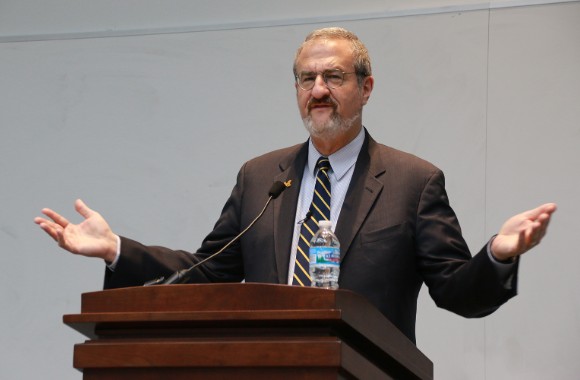
Bans lawyers even though it could easily pay for them, critics say
When an appeals court told the University of Michigan last year that it must allow cross-examination in sexual-misconduct proceedings, the judges gave the taxpayer-funded institution two options.
It could let the student parties cross-examine each other, which would be cheaper but could subject students to “further harm or harassment.” Or it could let their “agents” handle cross-examination, most likely lawyers, and either pay for representation itself or let students hire their own lawyers.
The university chose the cheaper option.
UMich is facing blowback from both pro-accuser and due-process advocates for implementing an interim policy that is considered even worse than the process struck down by the 6th U.S. Circuit Court of Appeals.
The interim policy, now eight months old, only allows cross-examination in sexual-misconduct proceedings if it is performed by the accusing and accused student – a situation the 6th Circuit was reluctant to endorse.
The change caught the attention of the ACLU’s Michigan affiliate and its national Women’s Rights Project, which penned a joint letter to the university Thursday.
They called on administrators to change this process so that “trained representatives” can conduct cross-examination, instead of accusers and accused students themselves.
A spokesperson for UMich told The College Fix it was continuing to ban lawyers from representing students out of concern that the parties couldn’t afford the same level of representation.
The university’s response is “absurd,” Brooklyn College Prof. KC Johnson, who chronicles Title IX litigation, told The Fix in an email.
The co-author of The Campus Rape Frenzy, who favors attorney-led cross-examination as the best vehicle for discovering the truth, cited UMich’s advertised $11.9 billion endowment as of last year (below) and its “leading law school”:
The university can easily afford to get lawyers for any student who can’t afford one–especially if the university is committed as [President Mark] Schlissel has contended to the fair adjudication of sexual assault on campus.
MORE: 6th Circuit cites ‘My Cousin Vinny’ to require Title IX cross-examination

Getting lawyers for 40 students a year better than ’emotional and psychological costs’
The 6th Circuit’s ruling was careful to say it was not granting accused students the “right to personally confront his accuser and other witnesses” in every case.
“Universities have a legitimate interest in avoiding procedures that may subject an alleged victim to further harm or harassment. And in sexual misconduct cases, allowing the accused to cross-examine the accuser may do just that,” the three-judge panel concluded.
That’s why it set forth the “agent” option, which delivers “the benefits of cross-examination—its adversarial nature and the opportunity for follow-up—without subjecting the accuser to the emotional trauma of directly confronting her alleged attacker.”
The Michigan ACLU and Women’s Rights Project seized on this language in their letter to President Schlissel (below), Vice President for Student Life Royster Harper and General Counsel Timothy Lynch.
They warned that the interim policy might “deter some students who have experienced sexual assault or harassment from filing complaints” and that it “risks contributing to a hostile environment on campus.” At the least it is “inconsistent with Title IX.”

MORE: UMich’s terrible, horrible, no good, very bad day at the 6th Circuit
UMich is not following the due process guidelines laid out in last fall’s Doe v. Baum, they argued.
The 6th Circuit cited a procedure recommended by the Supreme Court in a 1990 case against a kindergarten administrator accused of sexually abusing a 6-year-old. The 5-4 court determined that one-way “closed-circuit testimony” – used to protect the “alleged child victim” from the trauma of seeing the administrator – did not violate the 6th Amendment.
“The ACLU supports the requirement of a live hearing and an opportunity for cross-examination in higher education to assess credibility where serious sanctions such as expulsion, suspension, or notation on a student’s permanent school record are possible,” said the letter to UMich administrators.
It referred to the ACLU’s comments on the Department of Education’s proposed revision to Title IX regulations on campus sexual-misconduct proceedings.
The ACLU entities instead urged UMich to provide all students with legal counsel upon request, no matter their financial situation.
Only 20 “investigative resolutions into sexual harassment or assaults” were launched by the university in fiscal-year 2018, they noted, citing UMich’s annual report on the subject.
“The costs associated with providing attorneys for the roughly 40 students implicated in these cases would be well worth avoiding the emotional and psychological costs of subjecting students to further trauma and harassment,” they wrote.
UMich already uses lawyers as ‘hearing officers’
The university doesn’t believe the interim policy is at odds with the Baum ruling.
“The U-M student sexual misconduct policy is an interim policy put in place to comply with the ruling by the United States Court of Appeals for the Sixth Circuit,” spokesperson Rick Fitzgerald told The Fix in an email:
We continue to evaluate the effectiveness of the interim policy through feedback from the student community. U-M also is working to develop an umbrella policy for students, faculty and staff and separate procedures for students and employees, all of which will undergo vetting by our community.
While the Baum ruling also struck down the “single investigator” model used by the university – where one official serves as judge, jury and executioner – it focused on the necessity of “resolv[ing] factual disputes” in order to reach a legitimate or fair result.
Live hearings and cross-examination of adverse witnesses are “especially critical” to resolving disputes “that turn exclusively or largely on witness testimony,” the court said (below), before noting the problems in student-led cross-examination.
The Department of Education also recommends indirect cross-examination through advisors or agents in its proposed revisions to Title IX regulations, as cited by the ACLU entities’ letter last week.
They asked the university to provide “appointed counsel for any student who requests it,” training for representatives to avoid “abusive questioning,” and “hearing officers (ideally, attorneys) with relevant expertise and experience” who are “independent of the University community.”
Appeals court orders Univer… by The College Fix on Scribd
The university sees worse problems in the “agent” option, however. “Questioning by personal advisors – often attorneys – is not allowed at U-M out of concern that not all students would be able to afford counsel,” Fitzgerald said.
The process devised by the university already satisfies the 6th Circuit’s concerns, he continued:
U-M has selected three outside trial attorneys to serve as hearing officers, who are experienced in what constitutes appropriate cross examination questioning. In addition, students can request that the hearing be conducted with the students located in separate rooms using technology, or written questions with no sound or video, to communicate with each other. Of the nine hearings conducted to date under the interim policy, all have occurred with the students being separated.
The ACLU entities are not convinced by the university’s explanation. Their letter notes that the larger Michigan State University, as of February, now provides “cross-examination by representatives” and offers advisors to any student who requests one.
UMich is out of step with its own students, according to their letter, citing the ACLU entities’ discussions with representatives from myriad student groups about the interim policy.
They claim that the “overwhelming consensus” was that allowing accused students to personally cross-examine was the “worst imaginable option.” The letter notes that a petition against the interim policy, created by a “complainant in a non-Michigan Title IX case,” now has more than 65,000 signatures (below).
MORE: 6th Circuit requires cross-examination in campus rape cases

‘Abusers’ are still ‘presumed innocent’
The ACLU letter exposed the traditional fault lines between advocates for accusers and accused students as well.
Johnson, the professor who chronicles Title IX litigation, took issue in a Twitter thread with the ACLU entities using the term “abuser” to describe accused students.
In explaining why student-led cross-examination was out of step with Title IX, the ACLU entities said students told them that “being cross-examined personally by their abuser would be highly traumatic and would deter them from filing a complaint.”
This is “deeply troubling” language, Johnson wrote. “If the ACLU of Michigan or the ACLU Women’s Rights Project believe that accused students should be considered ‘abusers,’ they should explain how they reached that conclusion,” Johnson told The Fix.
I agree w/the policy position of @ACLUofMichigan—UM’s x-exam policy seemed designed to minimally comply w/Baum while retaining as unfair a process as possible. But some of the letter’s reasoning is startling coming from a *civil liberties organization*.https://t.co/Y1NfZSihLY
— KC Johnson (@kcjohnson9) September 5, 2019
“[E]ven in a preponderance scheme, the [accused] student is presumed innocent,” he wrote in the tweet thread.
“It’s not unreasonable to expect a letter written by a state ACLU branch, and a subcommittee of the national ACLU, to be precise in its language. This letter was not,” Johnson told The Fix.
He was perplexed by the ACLU of Michigan’s tweet announcing its letter to UMich, which uses the phrase “alleged abusers” instead of the “more neutral ‘accused’ or respondents.” The phrasing nonetheless is “an admission that all allegations might not be true,” Johnson said.
MORE: Judge rips UMich for evasion, bad faith in accused student’s suit
IMAGES: courtyardpix/Shutterstock, The University Record, University of Michigan Dearborn, Change.org
Like The College Fix on Facebook / Follow us on Twitter






Please join the conversation about our stories on Facebook, Twitter, Instagram, Reddit, MeWe, Rumble, Gab, Minds and Gettr.